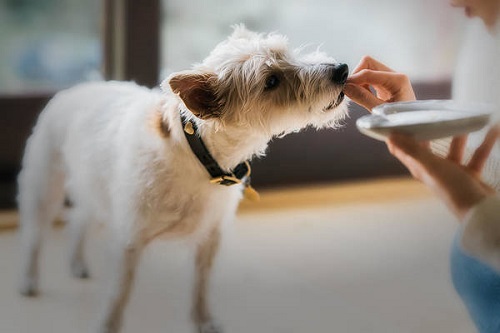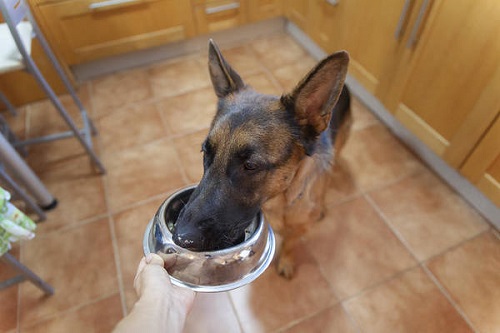Can Dogs Eat Ricotta Cheese? Discover if it’s safe to share this cheesy delight with your furry friend! Find out now.
Can Dogs Eat Ricotta Cheese? Let’s unleash the facts and learn if this creamy delight is a paw-some treat or a no-go zone. Keep on reading to know.
What is Ricotta Cheese?

The whey that is left over after making other forms of cheese is generally used to make ricotta cheese, which is a soft and creamy cheese. It has a gritty texture and a moderate, mildly sweet flavour. Italian food frequently includes ricotta cheese, which is a well-liked component of lasagna, cannoli, and cheesecake. Additionally, it can be eaten as a topping for fruits and vegetables or on its own.
Check out Is String Cheese Safe for Dogs? here
Can Dogs Eat Ricotta Cheese?
Yes, Dogs can eat Ricotta Cheese when served in a small quantity as an occasional treat.
Ricotta cheese can be a tasty and healthy addition to your dog’s diet when given in moderation and under the right circumstances. This soft and creamy cheese is made from the whey that remains after producing other types of cheese and has a mild and slightly sweet flavor, making it a popular ingredient in many Italian dishes.
Although it is acceptable for dogs to consume ricotta cheese, it’s crucial to remember that some dogs might be lactose intolerant and that consuming too much cheese or dairy products might cause gastrointestinal problems, including diarrhea and vomiting. As a result, it’s advised to give serve your dog with tiny amounts of ricotta cheese as a treat occasionally rather than as part of their usual diet.
Check out Is Cheese Safe for Dogs here
Is Ricotta Cheese Good for Dogs— A Few Health Benefits

While ricotta cheese should be fed to dogs in moderation, it does offer some potential health benefits when given as a treat.
- Whey Protein: Ricotta cheese is a good source of protein, which is essential for building and repairing muscle tissue in dogs.
- Calcium: It is rich in calcium, which is important for maintaining strong bones and teeth in dogs.
- Digestive Health: Ricotta cheese contains probiotics, which can help promote healthy digestion in dogs by supporting the growth of beneficial gut bacteria.
- Energy: Also a good source of energy for dogs, providing them with the calories they need to stay active and healthy.
Note: Ricotta cheese can have some health advantages, but it shouldn’t be used as a substitute for a diet that includes a variety of different foods.
Is Ricotta Cheese Bad for Dogs—A Few Health Concerns
While ricotta cheese may have certain health advantages for dogs, it’s crucial to be aware of the following medical issues:
- Lactose Intolerance: Dogs are generally lactose intolerant, and too much ricotta cheese or other dairy products can lead to gastrointestinal issues such as diarrhea and vomiting.
- Allergic Reactions: Some dogs may have an allergic reaction to ricotta cheese or other dairy products, resulting in symptoms such as itching, swelling, or difficulty breathing.
- Added Ingredients: Some ricotta cheese products may contain added ingredients that can be harmful to dogs, such as garlic, onions, or salt. Garlic and onions, in particular, can cause anemia in dogs if consumed in large quantities. High levels of salt can also lead to sodium poisoning.
- Obesity: Feeding your dog too much ricotta cheese or any other human food can lead to obesity, which can increase the risk of other health problems such as diabetes and heart disease in dogs.
Check out Is Cottage Cheese Safe for Dogs here
Safe Way to Feed Ricotta Cheese to Dogs

If you want to feed ricotta cheese to your dog, there are some safe ways to do so. Here are some steps to follow:
- Consult With Your Veterinarian: Before feeding your dog ricotta cheese or any other new food, consult with your veterinarian to ensure that it is safe and appropriate for your dog’s individual dietary needs.
- Start With a Small Amount: Introduce ricotta cheese to your dog’s diet gradually and in small amounts. A good starting point is to offer a teaspoon or less and monitor your dog for any adverse reactions.
- Choose Plain Ricotta Cheese: Avoid ricotta cheese products that contain harmful additives such as garlic, onions, or salt. Plain ricotta cheese is the best option for dogs.
- Monitor Your Dog for Adverse Reactions: Keep an eye on your dog for any allergic reactions or digestive issues such as diarrhea or vomiting after feeding them ricotta cheese. If any adverse reactions occur, stop feeding it immediately and consult with your veterinarian.
- Serve Ricotta Cheese as a Treat: Ricotta cheese should not be a replacement for a nutritionally balanced diet but can be given as an occasional treat in moderation.
Dog Safe Recipe Ricotta Cheese Recipe
Peanut Butter and Ricotta Cheese Cookies:
These ricotta and peanut butter cookies are a wonderful and nutritious treat for your dog. In contrast to ricotta cheese, which offers calcium and probiotics, peanut butter is a fantastic source of protein and healthy fats. Rolled oats give fiber and texture, while coconut flour is free of gluten and simple to stomach.
Ingredients:
- 1/2 cup smooth peanut butter (make sure it does not contain xylitol)
- 1/2 cup plain ricotta cheese
- 1 egg
- 1/4 cup coconut flour
- 1/4 cup rolled oats
- 1/4 tsp baking powder
Instructions:
- Preheat your oven to 350°F and line a baking sheet with parchment paper.
- In a large bowl, combine the peanut butter, ricotta cheese, and egg. Mix well.
- Add the coconut flour, rolled oats, and baking powder to the bowl and stir until well combined.
- Scoop the dough into small balls (about 1 inch in diameter) and place them onto the prepared baking sheet. Flatten the balls slightly with a fork.
- Bake the cookies for 10-12 minutes or until golden brown.
- Remove the cookies from the oven and let them cool on the baking sheet for a few minutes before transferring them to a wire rack to cool completely.
Check out Is Feta Cheese Safe for Dogs here
Quick Takeaways
So, Can Dogs Eat Ricotta Cheese? In moderation, it can be a safe and wholesome treat for dogs. Still, it’s crucial to be aware of any possible health issues, such as lactose intolerance, allergies, dangerous ingredients, and obesity. Before giving your dog any new food, including ricotta cheese, always seek the advice of your veterinarian.
Ricotta cheese should only be given as a supplement to a diet that is nutritionally sound. Ricotta cheese can be added to your dog’s diet in a secure and beneficial way by using the recipe for peanut butter and ricotta cheese cookies.
